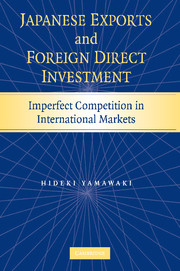Book contents
- Frontmatter
- Contents
- Tables
- Figures
- Preface
- 1 Introduction
- 2 Export Pricing Under Imperfect Competition
- 3 Export Price, Learning, and Domestic Demand Disturbances
- 4 Foreign Market Structure, Export Price, and Profitability
- 5 Competitive Advantage and Export Performance
- 6 Entry in the European and U.S. Manufacturing Industries
- 7 Strategic Interactions in Cross-Market Entry
- 8 Responses of Foreign Firms to Japanese Competition
- 9 Exit in the U.S. Manufacturing Industries
- 10 Interpreting the Empirical Findings
- 11 Implications
- Appendixes
- References
- Index
11 - Implications
Published online by Cambridge University Press: 08 January 2010
- Frontmatter
- Contents
- Tables
- Figures
- Preface
- 1 Introduction
- 2 Export Pricing Under Imperfect Competition
- 3 Export Price, Learning, and Domestic Demand Disturbances
- 4 Foreign Market Structure, Export Price, and Profitability
- 5 Competitive Advantage and Export Performance
- 6 Entry in the European and U.S. Manufacturing Industries
- 7 Strategic Interactions in Cross-Market Entry
- 8 Responses of Foreign Firms to Japanese Competition
- 9 Exit in the U.S. Manufacturing Industries
- 10 Interpreting the Empirical Findings
- 11 Implications
- Appendixes
- References
- Index
Summary
To conclude this study, we offer some implication of our findings for policy and future research.
Conceptual Framework
The central aspect of the theoretical framework used in this study is the premise that most of the trade and foreign direct investment is in the industries that are characterized as oligopolies. The old assumption of pure competition is replaced by the assumption of imperfect competition and that domestic and foreign firms are oligopolies. Generally speaking, the empirical results of this book provide evidence to support the imperfect competition approach in international trade. It is, however, important to note that the pattern of competition differs from one industry to another and that the assumption of imperfect competition in international trade may not be relevant for some industries.
Another aspect of the international oligopoly approach is the introduction of the market structures of both home and foreign countries into the model. Assuming that there are two countries, A and B, and that the firms in industry X in both countries engage in international trade, the profit-maximizing levels of output for export and export prices for the firm in country A are determined by the elements of market structure and basic conditions in the home market as well as in the foreign market. This model, therefore, differs importantly from the international linkage model used in the early empirical literature in industrial organization that takes into account only the home country's market structure to explain the trade behavior and performance.
- Type
- Chapter
- Information
- Japanese Exports and Foreign Direct InvestmentImperfect Competition in International Markets, pp. 199 - 206Publisher: Cambridge University PressPrint publication year: 2007



